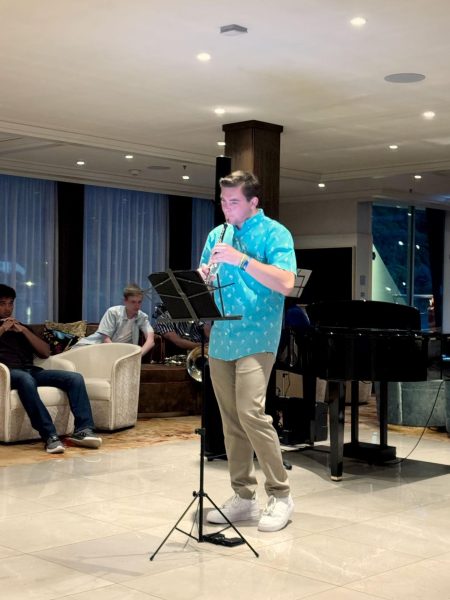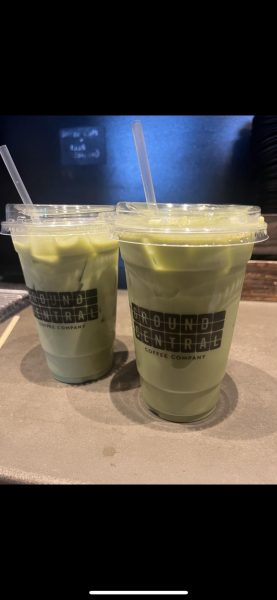“1-800-273-8255”: Logic’s Latest Hit
Rapper, singer, and songwriter, Logic released his fourth studio album called Everybody last April. Included on it was the track “1-800-273-8255,” featuring Alessia Cara and Khalid, which is targeted toward individuals struggling with depression. This song has blown up in the U.S. over the last few weeks, cracking the Billboard Top 10 songs list and bringing the lyrics’ deeper meaning into the media spotlight. Not only is this song catchy, but it’s lyrics have left audiences in tears and have helped those struggling with mental illness find a way to persevere past their troubles.
Suicide is a difficult subject to talk about. Many people have tragically taken their lives as a result of the effects of depression and mental illness. Not many suicidal people are comfortable opening up about their situation because they feel alone and helpless in their fight against depression. The song “1-800-273-8255,” or better known as simply “1-800,” discusses the feelings of someone dealing with depression through the perspective of a phone call to the Suicide Prevention Hotline, whose phone number is the title of the song.
Logic connects to the feelings of an individual dealing with depression throughout the song. In the song, he begins by saying, “I’ve been on the low; I been taking my time. I feel like I’m out of my mind. It feel like my life ain’t mine. Who can relate?” He uses these lines to connect to the feelings and thoughts of someone who has been in the position of contemplating suicide. He follows this by beginning the chorus, repeating the words, “I don’t want to be alive” several times, symbolizing an individual reaching out to the hotline and explaining his/her situation.
In the song, he continues to rap from the caller’s perspective, using lyrics like “I’ve been praying for somebody to save me, no one’s heroic,” and “I’m hurting deep down and can’t show it,” to make the listener understand what the caller is going through at this point in his/her life. What makes these lines so powerful is that many listeners can relate to these feelings at some point in their life. The song soon changes to the perspective of the receiver of the call, with Logic repeating, “I want you to be alive” in the same fashion as the first chorus.
Then, Alessia Cara’s verse begins, as she also sings in the responder’s point of view. Powerful lines like “It’s the very first breath when your head’s been drowning underwater,” and “And when you stare at your reflection finally knowing who it is, I know that you’ll thank God you did,” illustrate how life always gets better, no matter what situation one may be in. The whole song finishes with a heart-wrenching verse by Khalid, who sings, “Pain don’t hurt the same, I know. The lane I travel feels alone. But I’m moving ’til my legs give out, and I see my tears melt in the snow. But I don’t wanna cry, I don’t wanna cry anymore. I wanna feel alive, I don’t even wanna die anymore.” His voice sounds strained and emotional when he sings these final lines, concluding the song in such a way that makes the listener understand the pain that people with mental illness live with every day. His words, however; show that situations can get better and life always moves on. “It is one of my favorite songs right now. Not only is it great to listen to, but I know the meaning behind song is about an important issue that needs to be addressed more often in mainstream media,” said sophomore Nick Focarazzo.
When asked why he decided to make this song in an interview with Genius.com, Logic said, “Fans have said things like, ‘Your music has saved my life. You’ve saved my life…’ I was like, ‘Man I wasn’t even trying to save nobody’s life.’ And then it hit me, the power that I have as an artist with a voice. I wasn’t even trying to save your life. Now what can happen if I actually did?”
Logic is the kind of artist who is not afraid to discuss social and political issues in America through his songs and his concept albums. His most recent album called Everybody discusses issues that pertain to people of all kinds of races, genders, and sexual orientations among others. Specifically, he discusses these issues through his own point of view. In songs like “Black Spiderman” and “AfricAryaN,” he raps about his own battles with racism and growing up as a bi-racial individual. “Logic is just one of those amazing rappers who can send a very powerful message through his lyrics, put it to a great beat, and make a hit song. He is definitely one of my top-three favorite rappers of all time,” said sophomore Kelly Straub.
Logic recently delivered an emotional performance of the song at the Video Music Awards, and proceeded to give an inspirational speech about fighting for equality and the importance of spreading peace, love, and positivity, not hate and violence. This performance caused phone lines at the Suicide Prevention Hotline to increase by over 50%, proving just how powerful music can be when addressing serious issues like mental health. In the interview with Genius.com, Logic added, “And it’s beyond just this song. It’s the whole album. What can happen if I took myself out of my comfort zone and made a whole album about everybody and everybody’s struggles, including my own, which is one I’ve never done. What if I silenced my own fear and I say, ‘I’m scared talk about my race. I’m scared to talk about the state of this country but I’m going to do anyway. I’m going to persevere.’ Man, how many lives can I really save then?”























